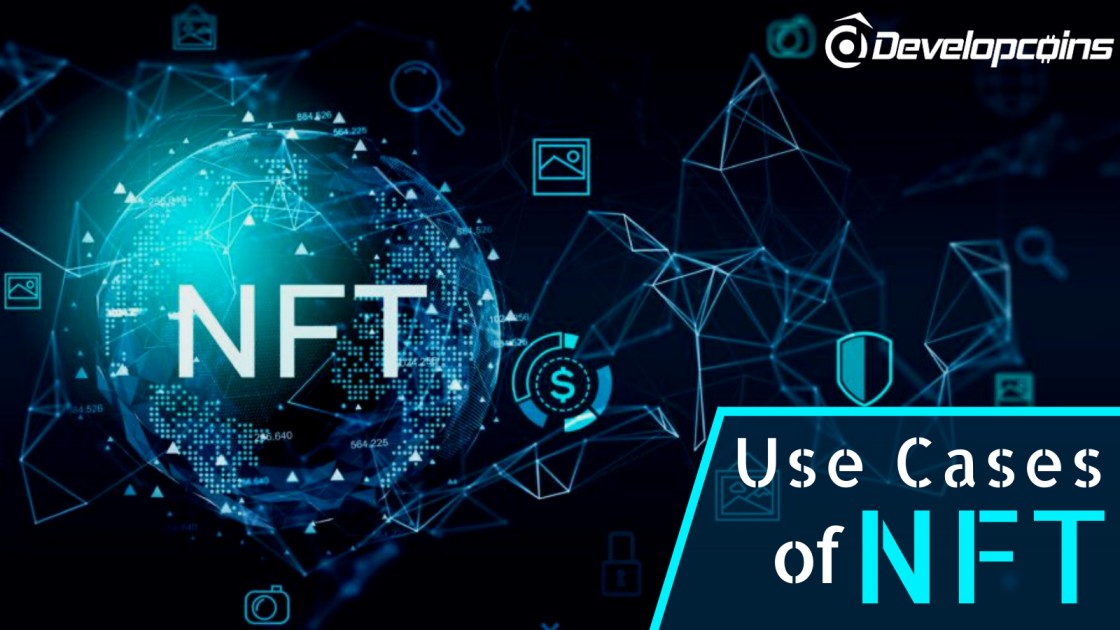

Developcoins, as a leading NFT Development Company helps you understand everything you need to know about NFTs and explore the wide range of use cases of NFTs.

Are you planning to begin a new venture? The information on NFT use cases in this blog will then cover everything you need to know.
According to expert study, the NFT market was worth $100 million in 2020. By the middle of 2022, this had tripled to $3 billion. These statistics demonstrate how the NFT had an impact on businessperson.
In this blog, we have discussed the importance of the NFT's use cases, and how it will benefit you.
As a sort of digital asset, NFTs, often referred to as Non-Fungible Tokens, are similar to works of art, music, video games, etc. They are exchanged for cryptocurrency while being bought and traded digitally. As an illustration, the creator of an NFT receives a commission in the form of cryptocurrency whenever the NFT is sold.
Every transaction on Blockchain powered-NFT is transparent since it is recorded on a ledger shared across several networks, preventing the manipulation of digital assets. NFTs are nothing but a discrete tokens that holds unique data which makes it easy to validate the ownership of the token in the market. These NFTs can traded easily just like any other digital asset.
Real Estate:
With the use of timestamped NFTs, land documents can be transferred, ownership can be established, and property value changes can be tracked over time. One of the industries that is most NFT-ready is the real estate market. While preserving sensitive information like credit card numbers, NFTs can be utilized in the real estate industry to streamline and speed up transactions, enabling smart contracts for properties (allowing automatic payments), or even develop decentralized house rental services.
Digital Art and Collectibles:
The majority of the people probably identify NFTs with digital art and collectibles. This association is not unjustified because traditional media has given this use case a lot of coverage. Furthermore, digital art representation using NFTs has been a well-established field for a while.
Gaming Industry:
NFTs and the gaming sector are a perfect fit. By enabling NFT cross-platform playability, NFTs can be integrated into the game industry. Game players are more motivated to continue playing a game if they already own characters or objects within it due to NFTs, which provide game producers another chance to grow their brand and generate another source of income.
Music NFTs:
The music industry is another fascinating field that might gain from NFTs. As you may already be aware, this sector maybe very lucrative for larger corporations and record companies. However, they frequently achieve their profits at the expense of the specific artist and through unfavorable penny-per-stream business methods.
Logistics NFT:
Due to its immutability and transparency, blockchain technology has potential applications in the logistics sector as well. These factors make sure that supply chain data is reliable and legitimate. Knowing where they have been and how long they have been there is crucial when dealing with food, commodities, and other perishable things.
Virtual Worlds:
The idea of purchasing land in the metaverse may not be as absurd as it first appears, despite the fact that it may appear to be a hollow futuristic return. On websites like Sandbox and Decentraland, we have seen the craze for virtual land ownership. These marketplaces, where you may purchase decentralized property parcels built using Blockchain infrastructure, will play a significant role in the development of digital ownership in the future.
Benefits of NFT:
Ownership:
The capacity to demonstrate ownership is the main advantage of non-fungible tokens. The assignment of property to a particular fund can be facilitated by NFTs because they run on a blockchain network.
Authenticity:
Non-fungible tokens' advantages largely depend on their individuality. On the blockchain, NFTs are produced, indicating that they are linked to particular data.
Transferability:
On some marketplaces with a large selection of trading options, it is simple to freely trade NFTs. NFTs, for instance, could resolve the issue of walled gardens in games.
Creating Economic Opportunities:
NFT professionals have focused mostly on their fundamental traits up to this point. NFTs are used in a variety of ways to create digital material in the modern world.
Boost Inclusive Growth:
The fourth and most important advantage of NFTs is that they support the spread of prosperity. NFTs can create new prospects for shared prosperity for all participants as they bring together content producers from all fields in a single setting.
Although NFT use cases are still in their early stages, it is apparent that they will benefit not only games but also everyday people going about their daily lives. There is a good chance that new concepts and use cases will increase as NFTs become more and more widespread in future. This will not only make many services easier to use, but it will also make more transactions transparent, especially when it comes to owning tangible things like real estate, artwork, ideas, concepts, and the like.
More advancement in this area is expected in the upcoming years, and at the rate that things are moving in the crypto world, you might want to invest in NFTs.
Now is the time to reach out to Developcoins, a leading NFT development company. With our expertise in the NFT industry, we can help you grab more details on NFT's utility.